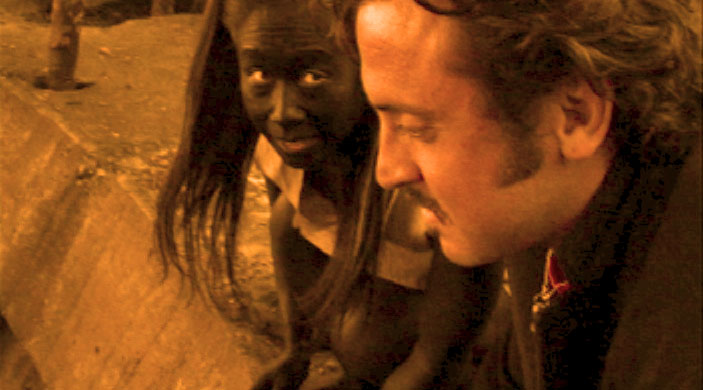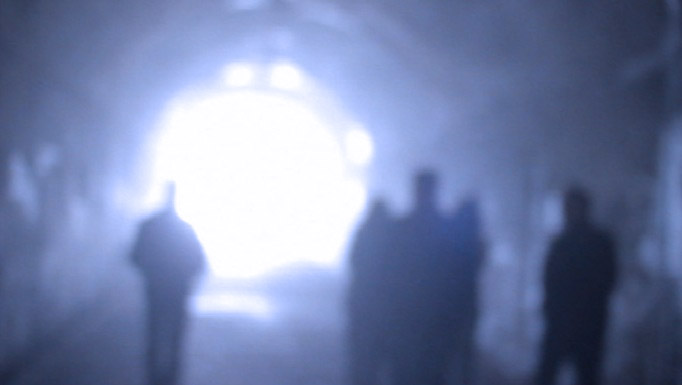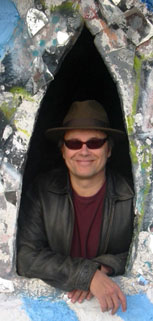HORIZON OASIS Lodge of the O.T.O.
An Interview with Antero Alli
by Mark Dalton (for "Sky's Embrace" newsletter)
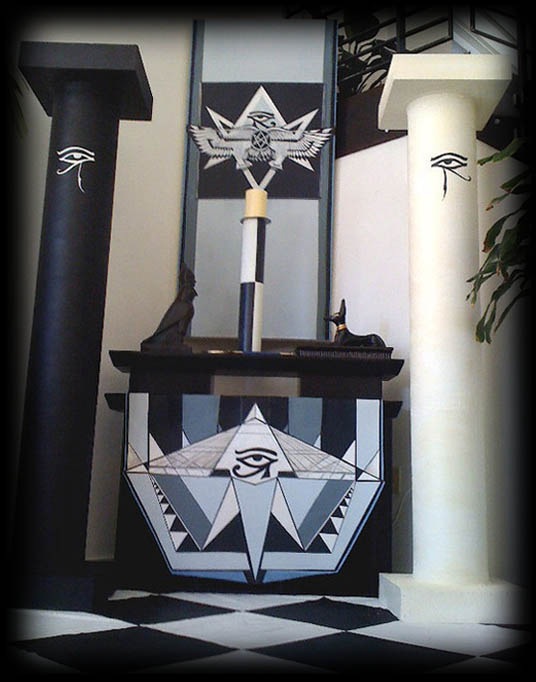
from "To Dream of Falling Upwards" (2011)
Mark: Thank you for agreeing to be interviewed for Sky's Embrace, Antero. First of all, I'd like to say I thoroughly enjoyed your last movie, To Dream of Falling Upwards, but it left me with one big question. When our two clowns are getting made up for a performance, and Adam complains to Craig about being "stuck at the Philosophus Grade" on his magickal path, Craig responds that Adam has to "go to the Devil first to have a conversation with your Holy Guardian Angel." When Adam is later complaining to Jack, the Temple Master, about Craig's response, Jack gives him apparently contrary advice - "your work is with Venus, not Saturn." Which is correct? Or are both applicable to Adam's (and perhaps to the audience's) situation?
Antero: 93. Great question. Only an O.T.O. member would catch that kind of detail. The Temple Master assigned his two hotheaded apprentices the ego-corrosive ritual of going into business together as clowns. Though his apprentices performed very well together before an audience, behind the scenes they were constantly nagging each other. Craig, the Adeptus Minor, kept mum in the face of Adam’s taunting him to spill the beans on how to achieve conversation with the HGA. Craig finally got so fed up he told Adam that he needed to face The Devil before he could meet the HGA. Adam took this to heart and told Jack, who immediately corrected him by suggesting that Adam was ready for the Netzach initiation, where Venus, not Saturn, would be his focus of advancement; love, not duty.
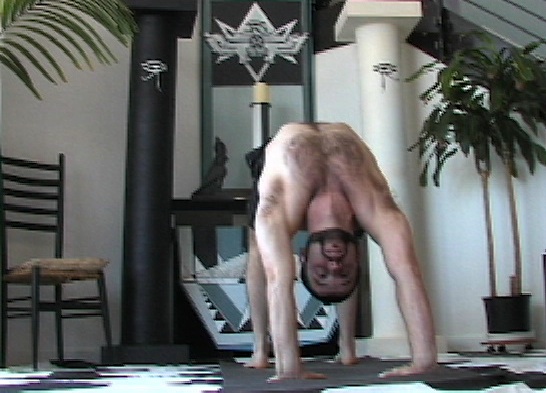
from "To Dream of Falling Upwards" (2011)
I saw both suggestions applicable to each situation and relationship. I think Adam needed a reality check and reflecting on The Devil set that into motion until he was corrected by the Temple Master. Adam needed that experience of correction. Since the arrogant Adam also needed to get over himself, I think the assignment of Venus proved a timely solution. As the moralist, Craig’s path to the HGA probably necessitated a face-off with El Diablo and so I suppose he assumed the same for Adam. In my own ritual practices, I’ve seen many paths to the HGA; it’s not necessarily the same for everyone. A lot depends on the individual and their specific hurdles, strengths, and weaknesses.
Mark: Placing your films into a larger context, I'd like to explore to explore several ideas and possible avenues of influence on your work, Antero - both as a filmmaker, and upon your fascinating work with "paratheatre laboratories" which form such a foundation for your films. First of all, Joseph Campbell, in his book Creative Mythology, spoke of our collective responsibility to create new myths to serve us, guide us, as the old myths and deities are no longer applicable to the revolutionary times we now live in. He spoke of a metaphorical "Grail Quest" as involving a personal adventure on a path not previously taken, through the thickest part of the forest, into unknown territory, guided by "an inner voice" as the established guides are inapplicable because they do not point to an individual's own unique way. Is this somewhat descriptive of the work that paratheatre participants undertake? Did Campbell's ideas have an influence upon your work?
Antero: Joseph Campbell was an early influence during the eighties until I discovered James Hillman. Though Campbell's “follow your bliss” wisdom served me well up to a point, Hillman’s erudite writings on the Anima/Animus, Puer, and Shadow archetypes resonated deeper with the immersion rituals of paratheatre I had been developing since 1977. This group ritual work combines techniques from theatre, dance, Zazen meditation, and vocalization in a comprehensive ritual technology for Self-initiation with the chief aim of gaining access to, and expression of, the internal landscape. I might add that paratheatre is also a highly kinetic, visceral medium where feeling the body deeply remains a central objective that, when met, enables us to source vital currents of energy in the body itself ...as movement resources.
The Grail metaphor remains close to my heart and reflects an ongoing process of yoking True Will and Essential Nature and then, acting accordingly. Paratheatre work certainly sets the stage for this Grail quest, given that the individual is already awakening to it, but the rituals themselves do not lead to the Grail. True initiation does not require ritual to occur; it is a spiritual event. At best a ritual can act as a device or a tool to assist the expression and integration of genuine initiation -- that which has never occurred to one before and for which one can never truly be pepared. The first initiation is Self-initiation -- the exposure of oneself to oneself. This means to leave the self-conscious watcher behind and enter the circle of participation. Words, images, explanations all belong to the watcher. To the participant -- experience is everything.
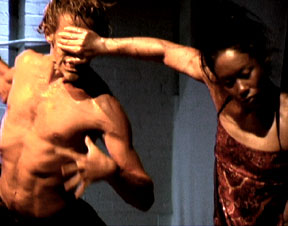
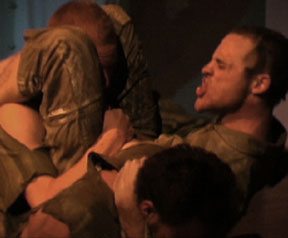
from "Orphans of Delirium" (2004)
a paratheatrical performance ritual
This approach to ritual tends to be iconoclastic in that we do not incorporate any set symbols or images in what we do. There are no god forms or famous deities to identify with. It’s more like paratheatre rituals act to dissolve and breakdown attachment to images, concepts, and symbols in lieu of gnosis -- a movement towards a more open-ended and direct perception, intuition -- epiphany. Though images and symbols can and do emerge out of gnosis, they often erupt spontaneously and without warning. They also tend to carry more numinosity and authenticity than the tinny images and concepts commonly generated by the thinking machine, no matter how clever or knowledgeable it may be. It has been through this gnosis process that many seed ideas and visions for my films have been born and, why I personally keep returning to paratheatre as a creative resource.
Not everyone does this work for these same reasons. Some do it to get high, to engage ecstatic and rapturous states. This hedonic motive tends to disperse after four or five sessions when development in this medium demands deeper motives than personal pleasure. Others do paratheatre as a vehicle for self-work, to expose and uproot unwanted behaviors and cultivate new patterns of response and expression. Many approach paratheatre as a spiritual practice, or yoga. Others want to learn new physical and internal techniques for their existing ritual practices and/or their public performances as singers, dancers, and actors. Some find value in the unique asocial nature of this group work as a novel way of relating with others and the world.
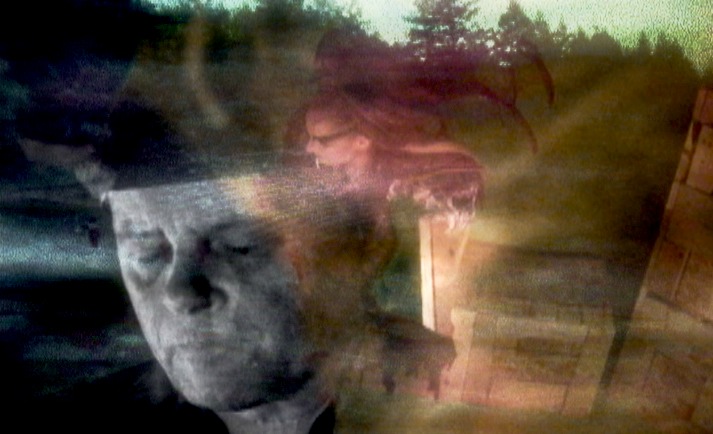
from "The Invisible Forest" (2008)
Mark: Antonin Artaud advocated a vigorous and revolutionary approach to revitalizing the theater, which he saw in our times as surrendering to the "Occidental [commercial] idea of art and the profits we seek to derive from it." Artaud advocated that we strive "to break through language in order to touch life.. to create or recreate the theater..." What influence did Artaud have on your filmmaking and, if any, on the development of your concept of paratheatre?
Antero: Artaud was my earliest theatrical influence. I voraciously consumed his book, THE THEATRE AND ITS DOUBLE, as a teenage acidhead during the psychedelic Sixties. What an imprint! As brilliant and revolutionary as his ideas are, Artaud was unable to fully materialize them in his lifetime. Many theatre artists since, myself included, have attempted to do so with only marginal success. It wasn’t until my 2008 film, “The Invisible Forest”, that I was able to create a vehicle to spin his visions through my own art. In this thinly veiled autobiographical film, I play a theatre director who takes his troupe out into a forest to apply Artaud’s ideas in paratheatrical experiments using monologues from Shakespeare’s “The Tempest” and “Romeo and Juliet”. At night, this director is haunted by reoccurring nightmares where his theatrical ambitions are openly mocked by the ghost of Artaud himself! In his attempt to locate the source of his disturbance, the director enters hypnotherapy. The lion’s share of the movie actually unfolds while he’s under hypnosis and on a journey through the labrynth of his subconscious.
Paratheatre work does indeed allow willing participants to not only "break through language in order to touch life” but also, to be touched by life. We act on life and are acted upon by life. There is action dictated by will and then there is action itself.
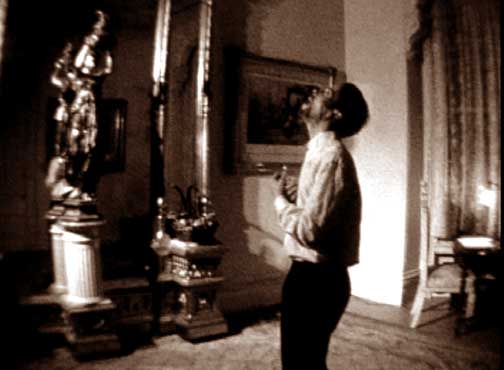
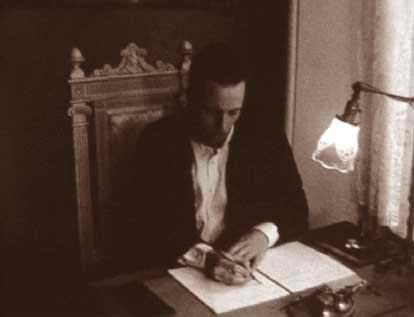
from "The Greater Circulation" (2005)
Most of the paratheatre work I do remains a non-performance oriented, private affair with no audience or audits involved. About every five to seven years, when a given group achieves a very high standard of this ritual technology, a public performance vehicle is developed and structured. At that point, more conventional elements are often introduced such as poetic text, songs, and other narrative devices. For example, in my 2005 film, “The Greater Circulation”, we used the poet Rainer Maria Rilke’s epic lament, “Requiem for a Friend”, as an oblique narrative in a live paratheatre performance that was filmed and later inserted into the movie’s over arching story of a group of actors staging an avante garde performance of Rilke’s “Requiem”.
Mark: Finally, in The Living Theatre's mission statement, Julian Beck speaks of the need to "fire the body's secret engines." This seems to fit with paratheatre's physicality, and especially the non-verbal techniques used in the BASICS laboratories that initially expose interested parties to paratheatrical concepts. Can you comment on how this works in terms of the individual, and eventually how this kind of work relates to your productions for audience viewing?
Antero: To me, the phrase “"fire the body's secret engines" speaks to kundalini activation and its sensitization and transformation of the central nervous system. In more esoteric terms, this means ignition of the energetic body or what Artaud refers to as “the double”. Longterm paratheatre work achieves these aims through the persistent meeting of the body’s central need to be felt deeply which liberates the fire in the belly. Feeling the body deeply is coupled with an ongoing Zazen practice we call “No-Form”, the crux technique of this paratheatre medium. No-Form cannot really be taught. It’s like talent - either you already have some intimacy and connection with the Void or you do not.
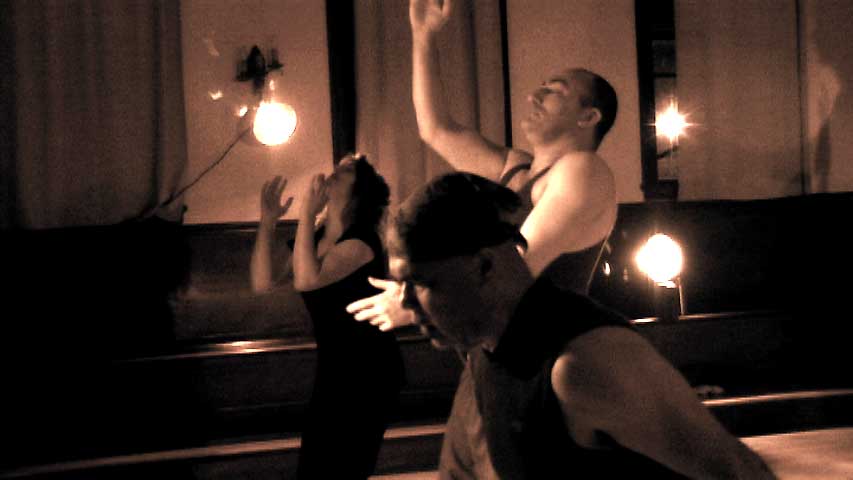
"dreambody/earthbody: a video document" (2012)
You mention the BASICS Labs. What they expose are not so much “the concepts of paratheatre” but a kind of via negativa process of de-conceptualization or a getting beyond mental constructs where participants are exposed to the existing conditions of their inner and outer lives -- not as concepts but as realities. This can be a very disconcerting process to anyone who has lived in their minds, in their heads, most of their lives. The primary arena of confrontation in this work remains with the self.
Most of our paratheatre work and training processes goes unseen by any audience. I produce a film every year or every other year and depending on the production requirements, I may introduce certain paratheatre forms and devices to the actors. Perhaps the most consistent quality and result of these applications can be witnessed by the audience as a kind of fierce openness and spontaneity in the actors, a certain fearlessness and commitment to the action at hand. Much of paratheatre training emphasizes the task of discovering how to increase the force and heat of our commitment. We look at commitment as a force that can be regulated once engaged.
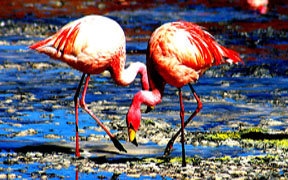
Phoeni-cop-ter-us; the Latin name for 'flamingo'
The flamingo has been known as the inspiration for the mythical Phoenix bird,
the ancient symbol for transformation and rebirth. At the end of its life,
the Phoenix is consumed by fire and reborn from the ashes.
Mark: Your 10th and newest feature film, FLAMINGOS (screening at Horizon Oasis on June 2nd), is described as an "outlaw romance noir." Can you deconstruct (or rather elaborate upon) this description a bit for us? Outlaw? Romance? Noir?
Antero: “Flamingos” was inspired by last year’s immersion in a 10-week paratheatre interaction with the Muse archetype which has striking parallels with the HGA. It’s impossible to go into the details of how the vision came about but suffice to say, the Muse wanted an outlaw romance noir story and what the Muses want, the Muses get. We worked with charged trinities in this Muses Lab which informed the three locations in Flamingos: a lawyer’s office, a seedy motel room, and a barren bardo-like interzone with a massive tunnel and a dilapidated stagnant sewage pool.
The characters. A bank robber hypnotizes bank tellers to hand over their cash. After a heist, he hides out in the motel room with his new lover . There’s the bank robber’s wife, his lover’s twin sister, who’s filing for divorce. And then there are two enigmatic entities working the bardo interzones who feed off the passions aroused by the lovers in the motel room. This tight triptych location structure contains one male and one female in each. As the heat is turned up, the film’s alchemy comes to life. FLAMINGOS is an outlaw noir tale of catastrophic romance that slowly messes with the sense of time and space while the haunted night dreams of our bank robber eventually become reality. That’s all I can say without spoiling the fun for viewers.
Mark: In his recent review of Flamingos, Mike Everleth said the film "is thoroughly remarkable in the way it packs dense, engaging layers of honest emotional and spiritual musings in an extremely constricting framework." Given that you agree with this basic assessment, please discuss how the work of paratheatre participants helps to inform, and to contribute to the honesty of these emotional and spiritual musings onscreen.
Antero: I do agree with Everleth’s film review, however, in “Flamingos” it was not necessary to introduce paratheatre techniques to the actors who were all cast for their improvisational talents. All the motel scenes were improvised over four days and nights living in the motel itself. Paratheatre is not the same as improvisation, as it’s known in theatre and other performing arts. Some of my other films have demanded more paratheatre processes, such as “The Invisible Forest”, “The Greater Circulation”, “Tragos”, and to a lesser extent, “To Dream of Falling Upwards” and “Under a Shipwrecked Moon”. However, the seed ideas and visions for “Flamingos” did emerge from my personal experiences doing the Muses Lab. The rhythms and choices in the post-production editing process were also informed by the Muses dictates. Editing may be the most creative of the many processes that go into making a movie.
Mark: Any other thoughts about Flamingos that you'd like to share with us?
Antero: Have you ever had the feeling that some part of you has already crossed over to the other side, while the rest of you is doing its best to kill time or stay creative until you’re totally gone? That’s the feeling that haunts Flamingos.
Mark: Thank you so much for sharing your thoughts with us, Antero, and for your support of Horizon Lodge OTO. It's been a great pleasure for me to connect with you, and we all look forward to seeing you again, with Flamingos, this June!
Antero: My pleasure. 93.
